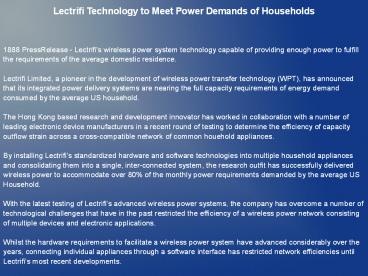Lectrifi Technology to Meet Power Demands of Households PowerPoint PPT Presentation
Title: Lectrifi Technology to Meet Power Demands of Households
1
Lectrifi Technology to Meet Power Demands of
Households
1888 PressRelease - Lectrifi's wireless power
system technology capable of providing enough
power to fulfill the requirements of the average
domestic residence. Lectrifi Limited, a pioneer
in the development of wireless power transfer
technology (WPT), has announced that its
integrated power delivery systems are nearing the
full capacity requirements of energy demand
consumed by the average US household. The Hong
Kong based research and development innovator has
worked in collaboration with a number of leading
electronic device manufacturers in a recent round
of testing to determine the efficiency of
capacity outflow strain across a cross-compatible
network of common houehold appliances. By
installing Lectrifis standardized hardware and
software technologies into multiple household
appliances and consolidating them into a single,
inter-connected system, the research outfit has
successfully delivered wireless power to
accommodate over 80 of the monthly power
requirements demanded by the average US
Household. With the latest testing of Lectrifis
advanced wireless power systems, the company has
overcome a number of technological challenges
that have in the past restricted the efficiency
of a wireless power network consisting of
multiple devices and electronic
applications. Whilst the hardware requirements
to facilitate a wireless power system have
advanced considerably over the years, connecting
individual appliances through a software
interface has restricted network efficiencies
until Lectrifis most recent developments.
2
Whilst we continue to improve the efficiency of
our hardware technologies, our focus leading up
to testing has been geared towards the way in
which individual devices communicate with each
other in response to the predetermined power
allocation processes required for day-to-day
consumption preferences, commented Lectrifis
Chief Technology Officer. We have developed a
user friendly interface that puts the consumer in
control of how power is distributed across each
device in the network at different times of the
day. The efficiency benefits of this have
dramatically reduced power flow strain across
multiple devices as power is restricted to
dormant devices and allocated towards sections of
intensive consumption when called upon by the
activation of devices. http//www.tech-news360.c
om

